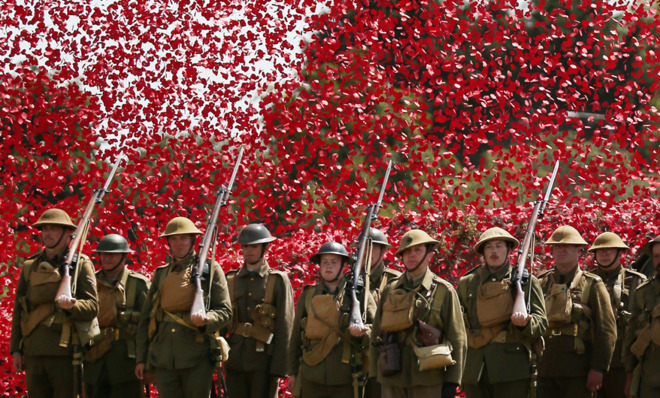Get ready to commemorate half a century of man's inhumanity
The centenary of World War I reminds us of what happens when we believe men and society can be perfected. It isn't pretty.


A free daily email with the biggest news stories of the day – and the best features from TheWeek.com
You are now subscribed
Your newsletter sign-up was successful
One hundred years ago this week, Sir Edward Grey, the foreign secretary for the British Empire, delivered a speech to Parliament in which he informed the nation that war was inevitable. German troops were marching even then. After the speech, he returned to his office with a newspaper editor and friend, John Spender. In a remark that could never be given so freely — or so literately — in the more democratic age to follow, Sir Edward said, "The lamps are going out all over Europe; we shall not see them lit again in our lifetime."
That line — so foreboding, prophetic, and sad — was the chief inspiration for events marking the centenary of World War I in Britain this week. From 10 p.m. to 11 p.m. on Aug. 4, lights were put out all over the United Kingdom. The gesture commemorated Grey's words, but it also invoked the lights-out orders given to civilians in the Second World War when the Luftwaffe dropped bombs over English cities. Many living today can recall the shattered buildings and craters that still dotted English cities into the 1970s.
This week marks the battle of Liège in Belgium, a surprise moral victory for the Allies, who were able to hold off German advances for 12 days. Already in this first week of bloodshed, piles of dead and dying German bodies were getting in the way of more shooting. World War I is the first instance in which human industry ran into this grim problem: Human corpses could not be buried fast enough for the killing to continue at full speed.
The Week
Escape your echo chamber. Get the facts behind the news, plus analysis from multiple perspectives.

Sign up for The Week's Free Newsletters
From our morning news briefing to a weekly Good News Newsletter, get the best of The Week delivered directly to your inbox.
From our morning news briefing to a weekly Good News Newsletter, get the best of The Week delivered directly to your inbox.
And so I was glad to see Europe engaging in some memorial activity that brought out the macabre. The grounds of the Tower of London have been decorated with porcelain red poppies, which run out of a tower window and across the ground like gushing tributaries of blood. There is something even now that angers me about the broad general consensus that the war was an utter disaster for Western civilization, that it likely deprived us of the genius of so many men, that it softened a world of strong and generally liberal empires for the rise of totalitarianism. We have achieved this consensus 100 years too late. How helpless.
RTE, Irish Radio, did a wonderful segment getting at the complications of empire within war. Irish troops battled alongside the British from the very beginning of the war. Some of these Irish came home from battle and found themselves at checkpoints where their fellow veterans, now in Black and Tan uniforms, beat and humiliated them for presuming comradeship. "These [Irish veterans] are the bastards teaching them how to shoot. How else are they learning?" a Tan would reason. Your lungs may still occasionally ache from trench warfare, but if you could afford a second coat, your countrymen held you as a profiteer. After the Irish Revolution, many Irish veterans felt they could never speak about their service — far less their pride in it. Like consensus about the war, sympathy for some of its veterans developed far too late.
The events this week are also a foreshadowing of what is about to come. We have about four or five decades of awful centenaries, marking the bloodshed of World War I, including the first major usage of chemical weapons in the modern era; the influenza pandemic for which that war was partially responsible; the Communist revolution; the Great Depressions; the rise of Mussolini, Hitler, Stalin, and later Mao. That's not to mention the Rape of Nanking, World War II, the Holocaust, the brutal purges in Russia, and genocide in eastern Europe.
As unpleasant as all this morbid remembrance may become, it beats the alternative, which is recapitulation. And these haunting ceremonies contain a valuable lesson: The gassing, the piles of bodies too thick to shoot over, the craters in the cities, the genocides, and gas chambers did not come from some dark turn in the human mind or grim acceptance of a dark and barbaric world. No, it was accompanied by philosophies, propaganda, and lickspittle journalism proclaiming the inevitability of progress, the oncoming utopia, and the perfectibility of man.
A free daily email with the biggest news stories of the day – and the best features from TheWeek.com
Michael Brendan Dougherty is senior correspondent at TheWeek.com. He is the founder and editor of The Slurve, a newsletter about baseball. His work has appeared in The New York Times Magazine, ESPN Magazine, Slate and The American Conservative.
-
 The ‘ravenous’ demand for Cornish minerals
The ‘ravenous’ demand for Cornish mineralsUnder the Radar Growing need for critical minerals to power tech has intensified ‘appetite’ for lithium, which could be a ‘huge boon’ for local economy
-
 Why are election experts taking Trump’s midterm threats seriously?
Why are election experts taking Trump’s midterm threats seriously?IN THE SPOTLIGHT As the president muses about polling place deployments and a centralized electoral system aimed at one-party control, lawmakers are taking this administration at its word
-
 ‘Restaurateurs have become millionaires’
‘Restaurateurs have become millionaires’Instant Opinion Opinion, comment and editorials of the day
